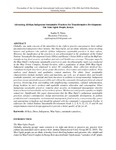Advancing Afrikan Indigenous Sustainable Practices for Transformative Development: The Mau Ogiek People, Kenya
Abstract
Globally, one main concern of the minorities is the right to practice and preserve their culture
unconstrained and protect their identity. The Mau Ogiek, are an ethnic minority, forest-dwelling
hunters and gatherers who embody Afrikan indigenous sustainable practices in their culture.
However, the significance of the practices is not acknowledged in the attainment of the United
Nations’ Sustainable Development Goals (SDGs) and Kenya’s Vision 2030 as well as the BigFour:
manufacturing, food security, agriculture and universal health care coverage. This paper unpacks
the Mau Ogiek’s indigenous sustainable practices to date. An ethnographic study was conducted
in the Mau Forest Complex, Nessuit location, with a population of about 2600 Mau Ogiek.
Judgement sampling was employed to select 84 consultants. Data collection involved keyconsultant
in-depth interviews, focus group discussions, observation and artifact analysis. Data
analysis used thematic and qualitative content analyses. The ethnic dress’ sustainable
characteristics include multiple styles and functions, up-cycle, use of natural dyes and locally
available materials, not wasteful and hand-me-down in addition to entrepreneurship. Indigenous
practices ensure sustainable peace within and without the community through provision of cultural
services, borrowing from and trading with neighbouring communities, cultural authentication,
fixing beehives in one’s territory and equitable resource allocation and consumption. Other
indigenous sustainable practices comprise food security, environmental management whereby
honey is harvested sustainably and sacredness of trees. Meritocracy and gender equality are highly
valued too. Significantly this paper demonstrates that the Mau Ogiek’s indigenous sustainable
practices advance contemporary design interventions for sustainable development, in fashion
production and consumption, environmental management, food security, entrepreneurship, peace
and appropriate technology and should be adopted with the community’s engagement. Further, it
addresses the United Nations’ Sustainable Development Goals 1, 2, 8, 9, 12, 13, 15 and 16 and
adopts human-centered design approach to provide a better quality of life for all.
Keywords: Afrikan, Dress, Indigenous, Mau Ogiek, sustainable practices,

